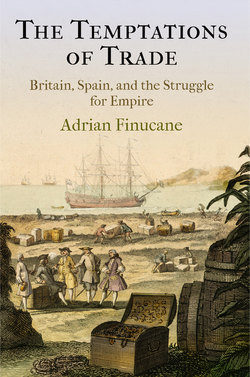The Temptations of Trade

Реклама. ООО «ЛитРес», ИНН: 7719571260.
Оглавление
Adrian Finucane. The Temptations of Trade
Отрывок из книги
THE TEMPTATIONS OF TRADE
Peter C. Mancall, Series Editor
.....
At the intersection of individual and imperial history, individuals’ decisions had impacts on empires, and individuals’ opportunities were created or limited by the particular forms empires took. Given these connections, this study approaches the history of the South Sea Company and the eighteenth-century British and Spanish empires through a biographical lens. Particularly detailed historical records have survived concerning the lives of Thomas Dover, John Burnet, Jonathan Dennis, and James Houstoun, all company employees who lived and worked in the Spanish empire, many for years. Attention to their individual lives allows for the reconstruction of the history of the British and Spanish empires at the level of the people building it, people who were tempted by the American trade and at the same time threatened by it.66
The South Sea Company trade offered a wealth of opportunity to a specific subsection of British and Spanish subjects, working within, on the margins, or outside the control of their empires. The early eighteenth-century Spanish and British empires were made up of a wide variety of interest groups, operating not only in courts and legislatures in Europe but also in the Americas. The development of the Anglo-Spanish slave trade in the British asiento period was part of a larger set of struggles, between private enterprises and those granted a monopoly by the state, between those who envisioned an empire mainly built on territorial expansion and those who wished to expand British power through trade, and between the needs of the empire as a whole and its agents on the ground, who were often most concerned with benefiting themselves.67 While the exercise of greater governmental control benefited those involved with the South Sea Company, those who had profited from the “salutary neglect” of the earlier period found themselves shut out of the imperial gains.68 In London, those involved with running the trade, and those few who were able to make their fortunes from South Sea stock before the bubble burst, also found the possibilities opened by the asiento contract quite exciting. The Spanish American subjects who received these British imports, in both slaves and merchandise, benefited also from access to otherwise unavailable goods, and some Spanish American officials were more concerned with supplying their viceroyalties and filling their pockets than with the policies promulgated from Madrid. Individuals from each empire connected, made friendships, and traded goods and information. This interimperial network, created on the ground in the Americas, created the necessary framework to facilitate interimperial commerce and guarantee profit to some.
.....